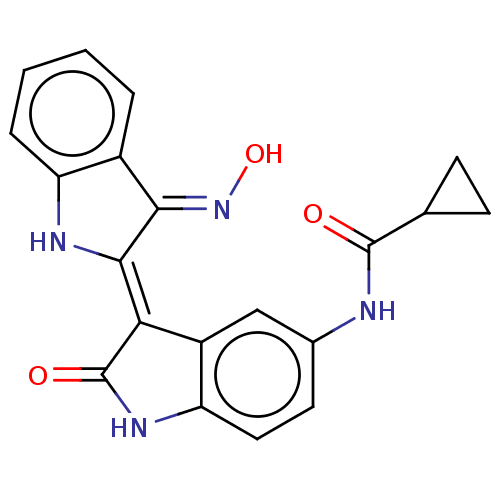BDBM50166251 CHEMBL3799389
SMILES O\N=C1\C(\Nc2ccccc\12)=C1\C(=O)Nc2ccc(NC(=O)C3CC3)cc12
InChI Key InChIKey=YQMFNWQNASFQAE-PLWLMNJCSA-N
Data 5 IC50
Activity Spreadsheet -- Enzyme Inhibition Constant Data from BindingDB
 Found 5 hits for monomerid = 50166251
Found 5 hits for monomerid = 50166251
TargetSerine/threonine-protein kinase 17A(Homo sapiens (Human))
Korea Research Institute Of Chemical Technology
Curated by ChEMBL
Korea Research Institute Of Chemical Technology
Curated by ChEMBL
Affinity DataIC50: 21nMAssay Description:Inhibition of DRAK1 (unknown origin)More data for this Ligand-Target Pair
TargetSerine/threonine-protein kinase 17B(Homo sapiens (Human))
Korea Research Institute Of Chemical Technology
Curated by ChEMBL
Korea Research Institute Of Chemical Technology
Curated by ChEMBL
Affinity DataIC50: 8nMAssay Description:Inhibition of DRAK2 (unknown origin) using MRLC3 peptide as substrate incubated for 2 hrs by ADP-Glo kinase assayMore data for this Ligand-Target Pair
TargetDeath-associated protein kinase 1(Homo sapiens (Human))
Korea Research Institute Of Chemical Technology
Curated by ChEMBL
Korea Research Institute Of Chemical Technology
Curated by ChEMBL
Affinity DataIC50: 140nMAssay Description:Inhibition of DAPK1 (unknown origin)More data for this Ligand-Target Pair
TargetDeath-associated protein kinase 2(Homo sapiens (Human))
Korea Research Institute Of Chemical Technology
Curated by ChEMBL
Korea Research Institute Of Chemical Technology
Curated by ChEMBL
Affinity DataIC50: 170nMAssay Description:Inhibition of DAPK2 (unknown origin)More data for this Ligand-Target Pair
TargetDeath-associated protein kinase 3(Homo sapiens (Human))
Korea Research Institute Of Chemical Technology
Curated by ChEMBL
Korea Research Institute Of Chemical Technology
Curated by ChEMBL
Affinity DataIC50: 140nMAssay Description:Inhibition of DAPK3 (unknown origin)More data for this Ligand-Target Pair
